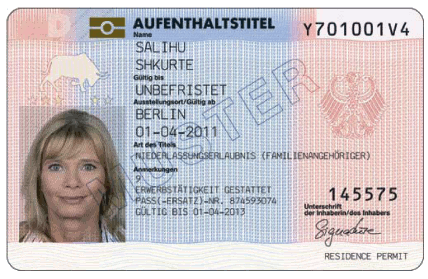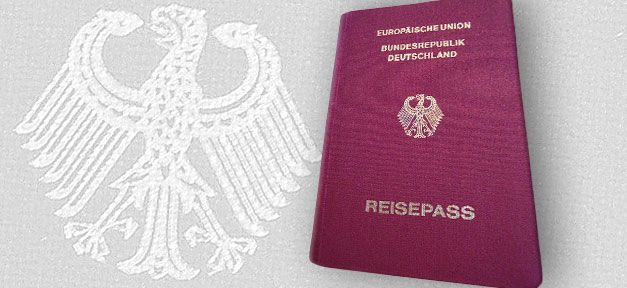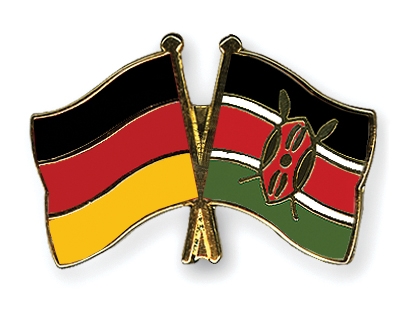The Niederlassungserlaubnis (permanent Residence permit) is a permit that allows foreigners from non-EU states to live and work freely in Germany. It’s also referred to as the unbefristete Aufenthaltserlaubnis.
For further information, please refer to the Aufenthaltsgesetz from 2008, Chapter 9 ( exact chapters and clauses are mentioned beside each issue discussed below). In cases of doubt, call your migration officer (Ausländerbehörde) or talk to your lawyer.
Contents
General Requirements
According to the Aufenthaltsgesetz from 2008 : ( § 9 Abs. 2 AufenthG), the Permanent residence permit may be issued to foreigners who have:
- been living in Germany for atleast 5years
- shown that they can sustain themselves without depending on the government
- been making payments into the federal pension fund (gesetzlichen Rentenversicherung) for at least 60months
- no criminal record
- at least B1 in German; good knowledge of German
- had a working permit or
- had a permit to be self-employed
- basic knowledge of the legal and social laws and the living conditions in Germany
- adequate living space
Cost of Getting a Permanent Residence Permit
The cost of getting a Niederlassungserlaubnis is determined by the Aufenthaltsverordnung (AufenthV) and should be between €135,00 and €250,00. The cost according to the different groups is: (§ 44 AufenthV)
- Highly qualified professionals – 250 Euro
- Self-employed – 200 Euro
- All others – 135 Euro.
Some other groups are also excempt from paying anything to get the permanent residence permit, these include: (§ 52 AufenthV)
- Spouses, life partners, underage single children (minors) and parents to German minors
- Swiss nationals: adults pay €28,80 and those aged below 24yrs pay: €22,80
- Asylum seekers and refugees
- People in Germany solely for Germany’s political interests
- People on a scholarship paid for by the government. The scholarship is paid for using public funds
- People without a job in Germany and are only here for training (Fort-, und Weiterbildung, Umschulung) may have the costs subsidized
- The fee may be waived or reduced in individual cases, when this serves to promote cultural or sporting interests, foreign policy, development of areas of vital public interest or for humanitarian reasons.
- Pupils, students, post graduate students and accompanying teachers who undertake trips for study or training purposes, and researchers from non-EU countries
Who may NOT apply for one?
Foreigners: ( § 9 Abs.3 AufenthG)
- whose entry into Germany was denied by the BAMF due to Germany’s political interests
- whose asylum application has not been decided regardless of which country within the EU they had applied for it
- holding a study visa, language visa, Ausbildung visa or any other form of study visa
- whose visas were only issued for a specified period e.g.
- those who get a work permit for a given period after which they should return to their home country
- if the relevant migration office has already ruled that the current visa was for a temporary stay
- those who come to Germany to be with their spouse who is also a foreigner and have no right to a visa if the relationship doesn’t work out
Special provisions for different groups
Although there are general requirements in order to get a permanent residence permits, there are special provisions for some groups.
Graduates from a German University (§ 18b AufenthG)
A non-EU foreigner who graduates from a German University or comparable institution in Germany, may get a permanent residence permit when they have:
- held a work permit for at least 2 years after graduation
- a job that relates to what they studied for (professional qualifications)
- paid into the federal pension fund (gesetzlichen Rentenversicherung) for at least 24months
- shown that they can sustain themselves without depending on the government
- no criminal record
- at least B1 in German; good knowledge of German
- had a working permit or
- had a permit to be self-employed
- basic knowledge of the legal and social laws and the living conditions in Germany
- adequate living space
Highly qualified Professionals (§ 19 AufenthG)
Highly qualified professionals are defined as:
- Scientists with special technical knowledge or
- teachers/professors/lecturers in prominent positions or scientific personnel in prominent positions.
For the highly qualified professionals living within the Federal Republic, a permanent residence may be gotten when:
- the Federal job agency (Bundesagentur für Arbeit) approves it based on § 39
- they are in a field that has been excempt by the Federal Ministry of Labour and Social Affairs (BMAS) from requiring an approval from the Federal job agency (Bundesagentur für Arbeit) or they are employed under an inter-country agreement between Germany and their home country §42
- they have integrated into the German society
- can sustain themselves without help from the government
EU Blue Card holders (§ 19a Abs. 6 AufenthG)
An EU Blue Card holder may get a permanent residence permit when they have:
- been in Germany for more than 33months (with good German skills then you only need to have been in Germany for 21months)
- had a job that relates to their professional qualifications
- been paying into the federal pension fund (gesetzlichen Rentenversicherung)
- shown that they can sustain themselves without depending on the government
- no criminal record
- at least B1 in German; good knowledge of German
- had a working permit or
- had a permit to be self-employed
- basic knowledge of the legal and social laws and the living conditions in Germany
- adequate living space
You can read more about EU Blue Card; How to apply for it and Degree professions or Technical Professions that can get you an EU Blue Card.
Self-employed Individuals (§ 21 Abs. 4 AufenthG)
An individual with a visa issued solely to “be their own boss”, has a visa for a maximum of 3years. After those 3 years, they can apply for a permanent residence permit when:
- their business has been successful in the 3 years and they can support their family from that business without government assistance
You can read, starting and running a business as a non-EU foreigner in Germany
Holders of visas Issued on Humanitaria grounds (§ 26 Abs. 3 und 4 AufenthG)
An asylum seeker or a person with a visa issued solely on humanitarian or political grounds may get a permanent residence permit if they have lived in Germany for 3years and their asylum application has been accepted by the BAMF.
A person with a visa issued solely on humanitarian or political grounds and has lived in Germany for 7 years and fullfils the following, may get a permanent residence permit:
- shown that they can sustain themselves without depending on the government
- been making payments into the federal pension fund (gesetzlichen Rentenversicherung)
- no criminal record
- at least B1 in German; good knowledge of German
- had a working permit or
- had a permit to be self-employed
- basic knowledge of the legal and social laws and the living conditions in Germany
- adequate living space
Individuals Married/Related to Germans (§ 28 Abs. 2 S. 1 AufenthG)
This clause applies to those:
- Married to a German national, (this includes a foreigner who may have taken up German citizenship)
- Are underage offsprings of a German
- Parent to an underage German
These group of people can have a permanent residence permit issued to them when they
- have been in Germany for 3 years
- are still living with the German (spouse, parent or child)
- have no reason to be deported
- have good knowledge of German
- show that they can sustain themselves without depending on the government
Children (§ 35 Abs. 1 S. 1 und 2 AufenthG)
An underage child in Germany, may have a permanent residence permit issued to them, if by the time they turn 16, they:
- have lived in Germany for 5years
- have a good command of German
- can sustain themselves or are doing an Ausbildung or is working towards joining the University
A permanent residence permit may not be issued in the case where, the child:
- has given authorities a reason to have them (the child) deported
- has been convicted in the last 3 years to a youth sentence (Jugendstrafe) of atleast 6months or has been imprisoned for at least 3 months or has been fined at least 90 days daily rates (Tagessätze) or has had a youth sentence suspended
- is supported by the government not unless the child is then doing an ausbildung
Germans who’ve taken up another nationality (§ 38 Abs. 1 S. 1 Nr. 1 AufenthG)
A German who has lost his German citizenship may have a permanent residence permit issued to them if:
- they have continuously lived in Germany for the last 5 years







I was recommended this blog by my cousin. I am not sure whether this post is written by him as no one else know such detailed about my difficulty. You are amazing! Thanks!